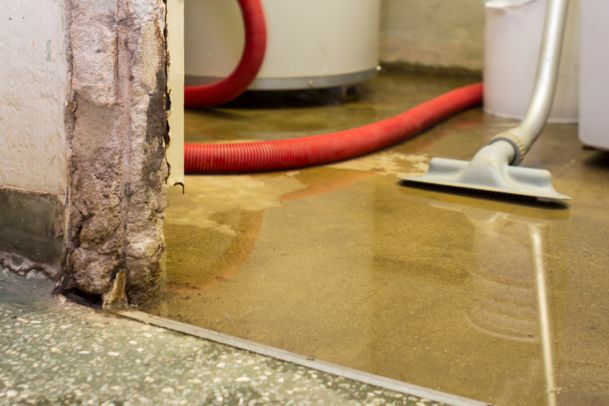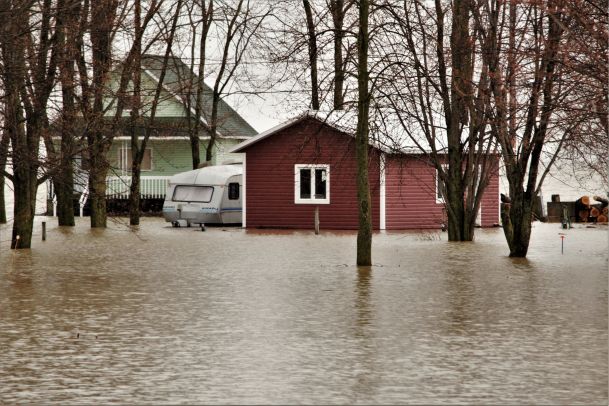
Written by Kayla Jane Barrie Updated on Nov 24, 2025 8 mins read

Water is the enemy of homeowners. It can cause significant damage, especially if it gets into your basement. This is why it's so important to take measures to protect your property from flooding, and ensure you have basement flooding coverage if you do have water issues.
As a homeowner or tenant, it’s important to understand what your property covers. In this blog, we will talk about if home insurance in Canada will cover basement floods. We will provide examples, prevention tips, and information for how to submit a claim for home insurance in the event of a flooded basement.
Whether insurance covers basement flooding depends entirely on the cause of the flooding and the specifics of your homeowner's or renter's insurance policy.
Basement flooding caused by a sudden and accidental event, such as a burst pipe, a sewer backup, or a heavy rainstorm overwhelming the drainage system, is more likely to be covered.
However, flooding resulting from gradual water damage, a faulty sump pump, or a cracked foundation is generally not covered under standard policies because it could have been prevented.
Many insurers offer optional flood insurance, which is separate coverage and necessary for protection against flooding from natural causes. Always review your policy carefully to understand your specific coverage and exclusions.
Insurance coverage for flooding depends on your type of policy. Standard policies generally do not cover flood damage. Flood damage is usually covered only by an additional flood policy.
However, there are some limited circumstances where a standard homeowner's policy might cover water damage from flooding, but these are exceptions:
Let's say the Miller family lives in a house with a finished basement used as a family room and home office. A severe rainstorm overwhelms the city's drainage system, causing a backup in the sewer line. This backup forces sewage and water into their basement, damaging the drywall, carpeting, furniture, and electronics. Because this was caused by a sudden and accidental overflow or backup of a sewer or drain, and not lack of maintenance, their insurance policy (which included additional water protection) covered the damages.
Basement flooding is often excluded from standard policies, or covered with significant limitations. CBC has recently reported on why insurance won’t cover you if your basement floods. Here are some common scenarios where basement flooding might not be covered:
The Millers' family insurance didn't cover the basement flood damage caused by heavy rain that overwhelmed the drainage system, as their policy excluded damage from overflowing water.
Although their sump pump malfunctioned, the adjuster noted the sheer volume of rain would have flooded the basement anyway. Standard coverage doesn't cover floods, requiring a separate policy, which the Millers regretted not having due to their creek-adjacent home. They now face significant repair costs.
Basement flooding insurance typically covers the damage caused by the flood itself, not the source of the flooding. This means your insurer will likely cover the cost of repairing or replacing damaged floors, walls, and the contents of your basement. Restoration costs, such as those for a cleanup crew, are also usually covered. However, the cost of repairing or replacing the source of the flood (e.g., a malfunctioning sump pump) is generally not covered.
If you store valuable personal items in your basement, it's crucial to review your contents insurance to ensure your belongings are covered.
To avoid out-of-pocket expenses for replacing damaged items at their current value, consider adding or evaluating replacement costs related to your policy. This ensures you'll receive the full cost of replacing damaged items, regardless of their age or depreciation.

Here are some statistics about basement flooding:
Basement flooding can stem from a variety of causes. Understanding these causes is crucial for preventative measures and choosing appropriate coverage. Here are some examples of common causes for floods:
You can prevent basement flooding by proactively addressing exterior and interior vulnerabilities, as mentioned by the City of Toronto. Here are 10 tips to consider to limit the risk of a flooded basement:
Finally, obtain additional coverage, especially if you live in a high-risk area, as standard homeowner's insurance rarely covers basement flooding.

A flooded basement is a serious situation requiring immediate action. Prioritize safety, then damage control, and finally, prevention for the future. Here's a breakdown:
Submitting a claim for basement flooding involves several steps. The process may vary slightly depending on your provider, so always refer to your policy and contact your insurer directly for specific instructions. Here is an overview of what to expect during the process:
No, standard homeowner's insurance typically does not cover basement flooding caused by rain. This is because rainwater flooding is generally considered a flood, and flood damage requires a separate policy. Homeowners policies usually cover water damage from sudden and accidental events like burst pipes, but not from the gradual accumulation of rainwater or overflowing sewers. To protect your basement against flooding from rain, you will need to purchase additional flood protection.
Surface water flooding occurs when rainwater runoff overwhelms drainage systems, causing flooding from rivers, streams, or heavy rainfall. Groundwater flooding occurs when the water table rises, allowing water to seep into basements and foundations from the surrounding ground. Surface flooding is often more sudden, while groundwater flooding is usually slower and more gradual.
Yes, a severely clogged drain, especially a main sewer line, can cause basement flooding. If the blockage is severe enough, wastewater can back up into the basement through floor drains or other openings, resulting in significant water damage. Regular drain maintenance is crucial to prevent this.
Insurance will cover basement floods depending on the cause and the type of coverage you have in place. If the basement leak is sudden and accidental, you might be covered, and if you have an endorsement for additional water coverage on your policy. Often, water damage is not covered by basic home policies. However, if the leak is caused by preventive maintenance, or repeat claims, you will likely not be covered.
Always carefully review your specific policy, as exclusions differ among insurers and policies. A thorough understanding of your homeowner's policy is crucial. If you reside in an area prone to flooding or have a basement, consider obtaining additional protection. The most effective way to clarify your coverage is to contact your provider.
If you are looking to learn more about your policy and what is excluded from a claim, speak with our brokers today. Our top-rated customer service team is ready to answer any questions and assist you in customizing a policy tailored to your needs.
| Categories | Home |
|---|---|
| Tags | Homeowners ClaimsHome MaintenanceProtect Your Home |
Read our insurance blog to get helpful tips, information and news.
Ontario’s Project CHICKADEE dismantled a $25 million auto theft ring. Discover how this massive bust targets export enablers and what it means for rising Canadian insurance premiums.
Think refusing a breath test helps your case? In Ontario, it results in a minimum fine of $2,000 and a criminal record. Compare the penalties and protect your future.
Impaired driving in Ontario is a serious offence. Learn about impaired driving fines, penalties, statistics and other important information all drivers in Ontario need to be aware of before they get behind the wheel.
Learn why parking violations are non-moving, how long they stay on your record, and the serious indirect risk of unpaid tickets.